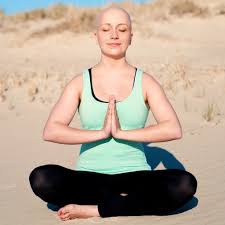Improve the Physical and Psychological Condition of Breast Cancer Patients with Yoga
By John M. de Castro, Ph.D.
“Studies suggest that doing yoga while going through breast cancer treatment helps you get through it with fewer side effects. Often doctors have to stop chemo or lower doses to levels that may not be as effective because people don’t tolerate the side effects. But yoga appears to decrease all kinds of side effects.” – Timothy McCall
About 12.5% of women in the U.S. develop invasive breast cancer over their lifetimes and every year about 40,000 women die. Indeed, more women in the U.S. die from breast cancer than from any other cancer, besides lung cancer. Breast cancer diagnosis, however, is not a death sentence. Death rates have been decreasing for decades from improved detection and treatment of breast cancer. Five-year survival rates are now at around 95%. The improved survival rates mean that more women are now living with cancer.
Cancer treatment involving surgery and radiation therapy and/or chemotherapy is extremely difficult physically and emotionally. In addition, surviving cancer, however, carries with it a number of problems. “Physical, emotional, and financial hardships often persist for years after diagnosis and treatment. Cancer survivors are also at greater risk for developing second cancers and other health conditions.” (National Cancer Survivors Day). Also, breast cancer survivors can have to deal with a heightened fear of reoccurrence, and an alteration of their body image. Additionally, cancer survivors frequently suffer from anxiety, depression, mood disturbance, Post-Traumatic Stress Disorder (PTSD), sleep disturbance, fatigue, sexual dysfunction, loss of personal control, impaired quality of life, and psychiatric symptoms which have been found to persist even ten years after remission. So, safe and effective treatments for the symptoms in breast cancer and the physical and psychological effects of the treatments are needed.
Mindfulness training has been shown to help with general cancer recovery and breast cancer recovery. Mindfulness helps to alleviate many of the residual physical and psychological symptoms, including stress, sleep disturbance, and anxiety and depression. The mindfulness practice of Yoga has also been shown to be helpful with the residual symptoms. So, it’s reasonable to further explore the potential benefits of yoga practice for women during and after treatment.
In today’s Research News article “Salute to the sun: a new dawn in yoga therapy for breast cancer.” See summary below or view the full text of the study at: https://www.ncbi.nlm.nih.gov/pmc/articles/PMC5587658/, Galliford and colleagues reviewed and summarized the published research studies of the application of yoga therapy or Mindfulness-Based Stress Reduction (MBSR), which contains yoga, for women with breast cancer. They found 38 published studies. They report that the research fids that yoga is effective in improving emotion regulation, quality of life, sleep quality, lymphatic system integrity, and social functioning, and decreasing anxiety, depression, and stress hormones (cortisol).
These are important findings that are fairly consistent across a variety of studies. The research clearly suggests that practicing yoga can benefit the social, psychological, and physical functioning of women with breast cancer. These are important benefits that suggest that yoga practice may improve women’s ability to fight breast cancer and maintain health and improve overall well-being.
So, improve the physical and psychological condition of breast cancer patients with yoga.
”For women with breast cancer, research shows those who practice yoga may also have less stress and fatigue, and better quality of life.” – Stacy Simon
CMCS – Center for Mindfulness and Contemplative Studies
This and other Contemplative Studies posts are also available on Google+ https://plus.google.com/106784388191201299496/posts and on Twitter @MindfulResearch
Study Summary
Galliford, M., Robinson, S., Bridge, P., & Carmichael, M. (2017). Salute to the sun: a new dawn in yoga therapy for breast cancer. Journal of Medical Radiation Sciences, 64(3), 232–238. http://doi.org/10.1002/jmrs.218
Abstract
Introduction
Interest in the application of yoga for health benefits in western medicine is growing rapidly, with a significant rise in publications. The purpose of this systematic review is to determine whether the inclusion of yoga therapy to the treatment of breast cancer can improve the patient’s physical and psychosocial quality of life (QoL).
Methods
A search of peer reviewed journal articles published between January 2009 and July 2014 was conducted. Studies were included if they had more than 15 study participants, included interventions such as mindfulness‐based stress reduction (MBSR) or yoga therapy with or without comparison groups and had stated physical or psychological outcomes.
Results
Screening identified 38 appropriate articles. The most reported psychosocial benefits of yoga therapy were anxiety, emotional and social functioning, stress, depression and global QoL. The most reported physical benefits of yoga therapy were improved salivary cortisol readings, sleep quality and lymphocyte apoptosis. Benefits in these areas were linked strongly with the yoga interventions, in addition to significant improvement in overall QoL.
Conclusion
The evidence supports the use of yoga therapy to improve the physical and psychosocial QoL for breast cancer patients with a range of benefits relevant to radiation therapy. Future studies are recommended to confirm these benefits. Evidence‐based recommendations for implementation of a yoga therapy programme have been derived and included within this review. Long‐term follow‐up is necessary with these programmes to assess the efficacy of the yoga intervention in terms of sustainability and patient outcomes.
